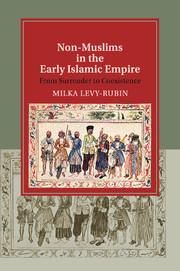Book contents
- Frontmatter
- Contents
- Illustrations
- Preface
- Introduction
- 1 The Roots and Authenticity of the Surrender Agreements in the Seventh Century
- 2 Shurūt ʿUmar and Its Alternatives
- 3 The Date and the Ideology of the Ghiyār Code
- 4 The Enforcement of Shurūt ʿUmar
- 5 The Provenance of the Modes of Subordination of Non-Muslims
- Conclusion
- Appendix I Al-Turtūshıī’s Version of Shurūt ʿUmar
- Appendix II Al-Shāfiʿıī’s Version of the Pact to Be Accorded to Non-Muslim Subjects
- Notes
- Glossary
- Bibliography
- Index
Appendix I - Al-Turtūshıī’s Version of Shurūt ʿUmar
Published online by Cambridge University Press: 05 January 2012
- Frontmatter
- Contents
- Illustrations
- Preface
- Introduction
- 1 The Roots and Authenticity of the Surrender Agreements in the Seventh Century
- 2 Shurūt ʿUmar and Its Alternatives
- 3 The Date and the Ideology of the Ghiyār Code
- 4 The Enforcement of Shurūt ʿUmar
- 5 The Provenance of the Modes of Subordination of Non-Muslims
- Conclusion
- Appendix I Al-Turtūshıī’s Version of Shurūt ʿUmar
- Appendix II Al-Shāfiʿıī’s Version of the Pact to Be Accorded to Non-Muslim Subjects
- Notes
- Glossary
- Bibliography
- Index
Summary
The translation of Shurūt ʿUmar adduced here is based on Bernard Lewis’s translation of al-Turtūshıī’s version in Sirāj al-mulūk (Lewis, Islam, pp. 217–19). The list of restrictions in the text is divided into clauses by the author for reference only, and is not found in the original. Select additions are given in parentheses: IM=Ibn al-Murajjā, Fadāʾil bayt al-maqdis; IQ=Ibn Qayyim al-Jawziyya, Ahkām ahl al-dhimma. For citations of the main versions of the Shurūt, see the introduction, n. 3.
We heard from ʿAbd al-Rahmān b. Ghanam [d. 78/697] as follows: When ʿUmar b. al-Khattāb, may God be pleased with him, accorded a peace to the Christians of Syria, we wrote to him as follows:In the name of God, the Merciful and Compassionate. This is a letter to the servant of God ʿUmar, Commander of the Faithful, from the Christians of such-and-such a city. When you came against us we asked you for safe-conduct (amān) for ourselves, our descendants, our property, and the people of our community, and we undertook the following obligations toward you:
We shall not build, in our cities or in their neighbourhood, new monasteries, churches, convents, or monks’ cells, nor shall we repair, by day or by night, such of them as fall in ruins or are situated in the quarters of the Muslims.
We shall keep our gates open wide for passersby and travellers. We shall give board and lodging to all Muslims who pass our way for three days. We shall not give shelter in our churches or in our dwellings to any spy, nor hide him from the Muslims.
We shall not teach the Qurʾān to our children.
We shall not manifest our religion publicly nor convert anyone to it. We shall not prevent any of our kin from entering Islam if they wish it.
[...]
- Type
- Chapter
- Information
- Non-Muslims in the Early Islamic EmpireFrom Surrender to Coexistence, pp. 171 - 172Publisher: Cambridge University PressPrint publication year: 2011

